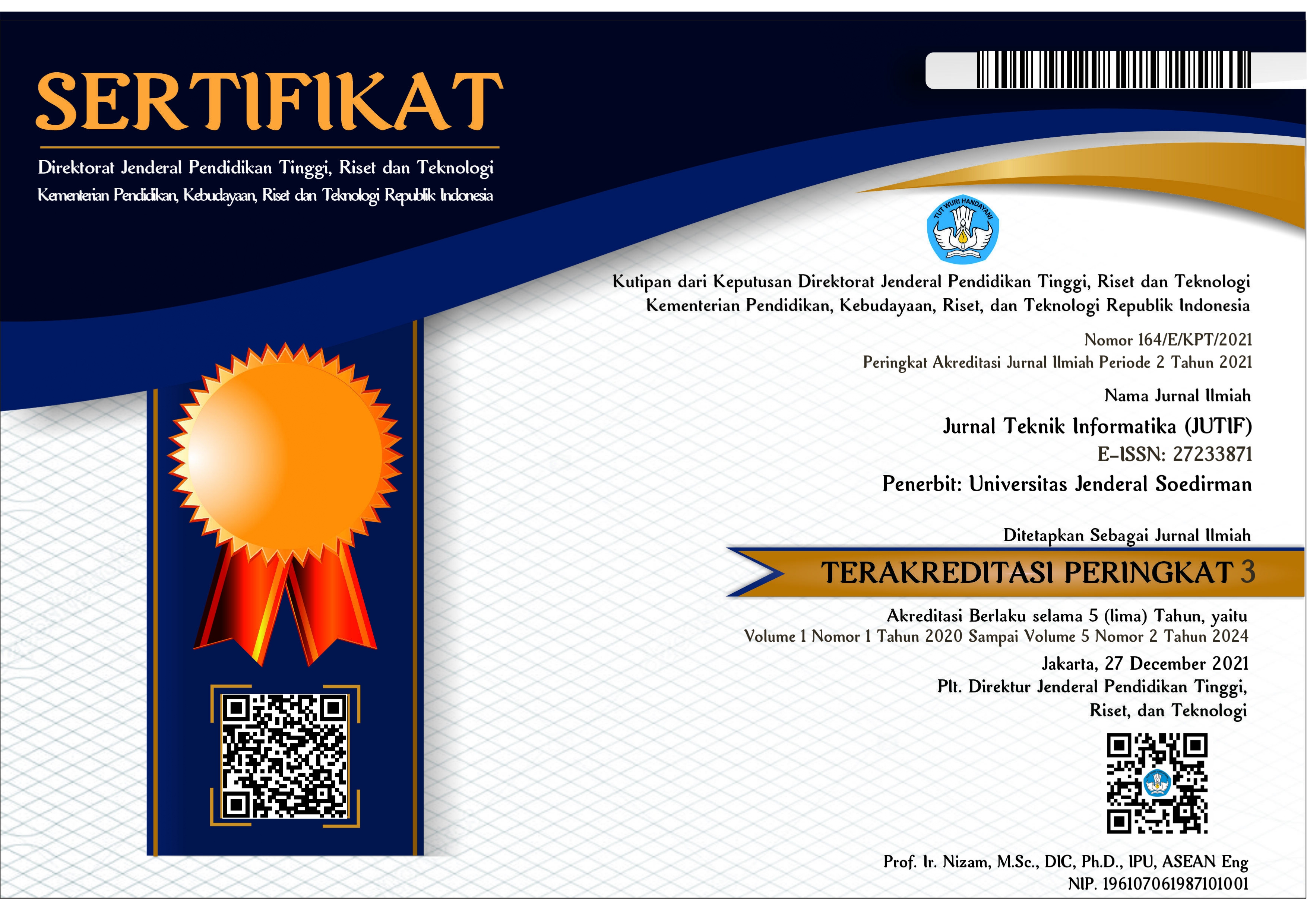DATA MINING TECHNIQUE USING NAÏVE BAYES ALGORITHM TO PREDICT SHOPEE CONSUMER SATISFACTION AMONG MILLENNIAL GENERATION
DOI:
https://doi.org/10.20884/1.jutif.2022.3.4.295Keywords:
Classification, Consumer Satisfaction, Data Mining, E-Commerce, Naïve Bayes AlgorithmAbstract
Shopee is one of the largest e-commerce platforms currently being used by Millennials. The use of Shopee itself makes it very easy for consumers to process transactions. Shopee itself is committed to maintaining and improving customer satisfaction so they don't switch to other competitors. However, it is undeniable that there are still many cases that can harm consumers when using the platform. With the cases that occur, it is very possible that there will be a big influence on the level of consumer satisfaction on the platform. Consumers will feel satisfied when the product or service used can meet consumer expectations. This study was made with the aim of predicting the level of consumer satisfaction of Shopee Indonesia among the Millennial Generation. This study applies data mining using the Naive Bayes Algorithm. The Naive Bayes algorithm itself is a simple probability classification that can calculate all possibilities by combining a number of combinations and the frequency of a value from the database obtained. The attributes used in conducting this research include Name, Gender, Age, Price, Performance and Efficiency, Fulfillment, Reliability, Control and Security, Responsiveness, Compensation, Contact, and Description of Satisfaction Value. In this study, the results obtained from several input attributes that create a causal relationship when classifying satisfied and dissatisfied consumers. The results obtained can provide benefits for the Shopee company in increasing customer satisfaction. After carrying out the testing process, it can be concluded that the Naive Bayes Algorithm is an algorithm that is suitable for use in the classification process for measuring Shopee Indonesia's consumer satisfaction level among the Millennial Generation, with an accuracy rate of 89.65%.
Downloads
References
K. F. Sandy, “No TGenerasi Milenial Pengguna Transaksi e-Commerce Paling Banyakitle,” https://ekbis.sindonews.com/, 2018. https://ekbis.sindonews.com/berita/1357811/34/generasi-milenial-pengguna-transaksi-e-commerce-paling-banyak (accessed Feb. 01, 2021).
Alwendi, “Penerapan E-Commerce Dalam Meningkatkan,” Manaj. Bisnis, vol. 17, no. 3, pp. 317–325, 2020, [Online]. Available: http://journal.undiknas.ac.id/index.php/magister-manajemen/.
chusnul hajijah Murni, “PELANGGAN PADA ONLINE SHOP DI SHOPEE Pembimbing :,” 2020.
A. Kurniawati and N. Ariyani, “Strategi Promosi Penjualan pada Marketplace Shopee,” Propaganda, vol. 2, no. 1, pp. 65–79, 2022, doi: 10.37010/prop.v2i1.514.
Sambodo Rio Sasongko, “Faktor-Faktor Kepuasan Pelanggan Dan Loyalitas Pelanggan (Literature Review Manajemen Pemasaran),” J. Ilmu Manaj. Terap., vol. 3, no. 1, pp. 104–114, 2021, doi: 10.31933/jimt.v3i1.707.
M. G. M. Wibowo, “Peran Ketidakpuasan Konsumen Dan Pencarian Variasi: Sebuah Studi Perpindahan Merek,” J. Ilmu Manaj., vol. 8, no. 2011, pp. 80–86, 2020.
N. I. Purnama, Y. Siswadi, and S. Mujiatun, “Model Perilaku Brand Switching Konsumen Dalam Pembelian Produk Otomotif,” J. Ilm. Manaj. Dan Bisnis, vol. 22, no. 2, pp. 151–163, 2021, doi: 10.30596/jimb.v22i2.7305.
R. Rachman and R. N. Handayani, “Klasifikasi Algoritma Naive Bayes Dalam Memprediksi Tingkat Kelancaran Pembayaran Sewa Teras UMKM,” J. Inform., vol. 8, no. 2, pp. 111–122, 2021, doi: 10.31294/ji.v8i2.10494.
K. Sulastri, “Klasifikasi Naïve Bayes pada Analisis Sentimen atas Penolakan Dibukanya Larangan Ekspor Benih Lobster,” vol. 1, no. 2, pp. 68–75, 2020.
S. M. Sinaga, J. T. Hardinata, and M. Fauzan, “Implementasi Data Mining Clustering Tingkat Kepuasan Konsumen erhadap Pelayanan Go-Jek,” Kesatria J. Penerapan Sist. Inf. (Komputer dan Manajemen), vol. 2, no. 2, pp. 118–124, 2021.
M. Siddik, Y. Desnelita, and Gustientiedina, “Penerapan Naïve Bayes untuk Memprediksi Tingkat Kepuasan Mahasiswa Terhadap Pelayanan Akademis,” J. Infomedia, vol. 2, no. 4, pp. 89–93, 2019, [Online]. Available: http://e-jurnal.pnl.ac.id/index.php/infomedia/article/view/1892.
A. R. Damanik, S. Sumijan, and G. W. Nurcahyo, “Prediksi Tingkat Kepuasan dalam Pembelajaran Daring Menggunakan Algoritma Naïve Bayes,” J. Sistim Inf. dan Teknol., vol. 3, pp. 88–94, 2021, doi: 10.37034/jsisfotek.v3i3.137.
T. H. Apandi and C. A. Sugianto, “Algoritma Naive Bayes untuk Prediksi Kepuasan Pelayanan Perekaman e-KTP ( Naive Bayes Algorithm for Satisfaction Prediction of e-ID,” JUITA (Jurnal Inform. UMP, vol. 7, no. November, pp. 125–128, 2019.
A. A. Argasah and D. Gustian, “Data Mining Analysis To Determine Employee Salaries According To Needs Based On The K-Medoids Clustering Algorithm Analisis Data Mining Untuk Menentukan Gaji Karyawan Sesuai Penilaian Kemampuan Menggunakan Algoritma K-Medoids,” Jutif, vol. 3, no. 1, pp. 29–35, 2022.
A. Alwi, P. Studi, T. Informatika, F. Teknik, and U. M. Ponorogo, “the Concept of Naive Bayes and Its Simple Use for Prediction Final Konsep Naive Bayes Dan Penggunaannya Secara Sederhana,” vol. 3, no. 1, pp. 133–140, 2022.
Sofyan, “Implementation of Data Mining with Association Rule in Decision Making for Product Purchase Correlation Using the Apriori Algorithm,” J. Chem. Inf. Model., vol. 53, no. 9, pp. 1689–1699, 2019.
F. S. Nugraha, M. J. Shidiq, and S. Rahayu, “Analisis Algoritma Klasifikasi Neural Network Untuk Diagnosis Penyakit Kanker Payudara,” J. Pilar Nusa Mandiri, vol. 15, no. 2, pp. 149–156, 2019, doi: 10.33480/pilar.v15i2.601.
P. R. Sihombing and A. M. Arsani, “Comparison of Machine Learning Methods in Classifying Poverty in Indonesia in 2018,” J. Tek. Inform., vol. 2, no. 1, pp. 51–56, 2021, doi: 10.20884/1.jutif.2021.2.1.52.











